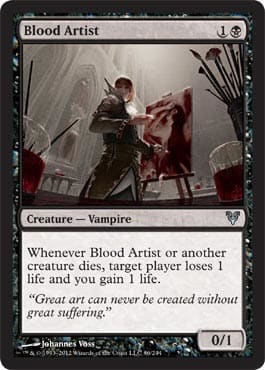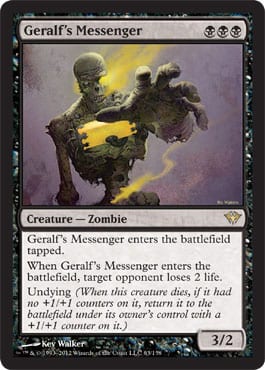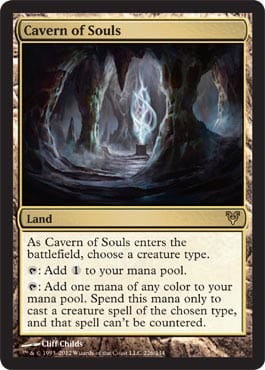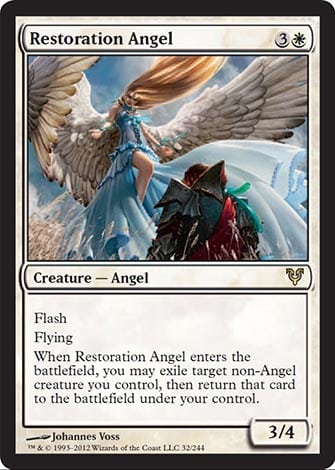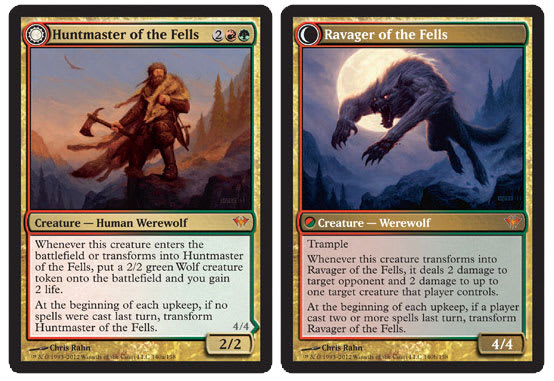I don’t believe this happens too often to good players: You see a deck at a tournament, and you think, “OH MY GOD, THAT’S AWESOME.” So you try to replicate it because it hits that rarified combination of, “This could be good enough to win,” and, “I love this deck more than I do most of my extended family.”
This is the deck I’m talking about; without further ado, Cory Dissinger’s sixth-place deck from the Pro Tour Qualifier in Wilmington, Delaware on June twenty-fourth:
"Cory Dissinger’s W/B Zombie Pod"
- Creatures (24)
- 1 Butcher Ghoul
- 1 Skinrender
- 1 Skirsdag High Priest
- 2 Blade Splicer
- 2 Restoration Angel
- 4 Blood Artist
- 4 Diregraf Ghoul
- 4 Geralf's Messenger
- 4 Gravecrawler
- 1 Phyrexian Metamorph
- Spells (14)
- 3 Geth's Verdict
- 3 Tragic Slip
- 2 Killing Wave
- 3 Birthing Pod
- 3 Mortarpod
- Lands (22)
- 4 Plains
- 8 Swamp
- 1 Evolving Wilds
- 2 Vault of the Archangel
- 3 Cavern of Souls
- 4 Isolated Chapel
- Sideboard (15)
- 2 Celestial Purge
- 2 Despise
- 3 Divine Offering
- 3 Mental Misstep
- 1 Phyrexian Metamorph
- 1 Sorin, Lord of Innistrad
- 3 Surgical Extraction
I sat next to Cory Rounds 2 and 3; he said he was a Legacy player who just brewed up the deck the night before with the intent of having fun. As it turns out, he came up with a pretty powerful deck, one that piqued my interest enough to run at FNM last week.
Here’s the list I came up with:
"W/B Zombie Pod Mark II"
- Creatures (26)
- 1 Blade Splicer
- 1 Stonehorn Dignitary
- 3 Butcher Ghoul
- 4 Blood Artist
- 4 Diregraf Ghoul
- 4 Geralf's Messenger
- 4 Gravecrawler
- 4 Restoration Angel
- 1 Phyrexian Metamorph
- Spells (12)
- 4 Tragic Slip
- 2 Killing Wave
- 3 Birthing Pod
- 3 Mortarpod
- Lands (22)
- 4 Plains
- 8 Swamp
- 1 Evolving Wilds
- 2 Vault of the Archangel
- 3 Cavern of Souls
- 4 Isolated Chapel
- Sideboard (15)
- 2 Suture Priest
- 1 Leonin Relic-warder
- 2 Phyrexian Metamorph
- 2 Divine Offering
- 3 Celestial Purge
- 1 Stonehorn Dignitary
- 3 Nihil Spellbomb
- 1 Thalia, Guardian of Thraben
It’s the same idea as the list I posted a couple weeks back: a Zombie Pod deck revolving around the crazy interaction that is sacrificing a Geralf's Messenger to a Birthing Pod to go fetch a Restoration Angel.
Here are the decks I played against on Friday:
- W/B tokens
- W/U Delver
- R/G aggro
- U/B Delver
- Naya aggro
- R/U/G Pod
In case you’re bad with numbers, we ended up having a six-round FNM last week. I ended up 4–2, with losses to R/G aggro and, of all things, U/B Delver. I’ll try to illustrate what works and what doesn’t against all the decks.
W/U Delver
There isn’t much more satisfying that beating a dude with a foiled-out deck. My W/U Delver opponent from last Friday had all of the cards foiled, including foil Unhinged Islands. When he offered his deck to me to cut and I picked it up to shuffle it, he gave a quick, PLEASE-DON’T-RIFFLE-SHUFFLE yelp, which I’ll admit was immensely satisfying.
One of the things I really wanted to figure out with this column is why people go for an aesthetic look to their decks at all in a competitive setting, and what I’ve come up with is that you reach a point that it has less to do with wanting your deck to be aesthetically pleasing and more about just being insecure. It’s the same reason “bling” is a word in our lexicon—it’s all about people desperate to appear rich.
Okay, you probably wanted to know about the Delver matchup.
Traditionally, W/U Delver has a hard time dealing with Zombies. It also has a hard time dealing with the incremental card advantage its opponent can slowly generate with a Birthing Pod. So that matchup should be a bye for the W/B Zombie Pod deck, right?
Unfortunately, Magic decks don’t work like that.
When you combine the two strategies, you have to concede that you’re actually just diluting both strategies and will not have two different decks in your hands, but rather, a deck the speed of which is somewhere in the middle of the two. There are always the outlier draws when you draw a million 1-drops and top everything off with a few Geralf's Messengers to kill an opponent off in a flurry, but for the most part, the Pod deck is going to be slower than the average Zombies deck.
Luckily, Delver’s Vapor Snags—the card Delver generally uses to slide under aggressive opponents—are pretty bad here; Delver players have their choice of bouncing a 1-drop or a Geralf's Messenger. Basically, your low curve will force them to match you on creatures or lose. Don’t play your Birthing Pod into their Mana Leaks if you don’t have to—if a Delver player is holding up 2 mana on his second or third turn, it usually means that he’s doing so at the cost of advancing his board. It’s also a good rule of thumb to not run out Cavern of Souls until you absolutely need it to resolve a creature; if you’re able to get your opponent to think you have a Cavernless draw, only to play a third-turn Cavern of Souls into Geralf's Messenger, you get to put him way behind on tempo since he had held up mana to counter your play.
Game 2, a Delver player will bring in Timely Reinforcements and Celestial Purge, neither of which is exceptional against your deck. If he Celestial Purges your man on his third turn, that’s totally okay because that means he isn’t resolving Geist of Saint Traft. If he waits on his Celestial Purges, you blow him out with Restoration Angel. The Delver player will be cognizant of this, which is why he’ll usually blow his Celestial Purges early while you’re tapped out in lieu of advancing his own board.
Just accept that your Blood Artists and his Gut Shots will cancel each other out.
My Delver opponent last Friday resolved three Timely Reinforcements against me in our second game (I won the first). Two of them were for full value, and the third was just for the 6 life. It didn’t end up mattering, if only because three 1/1s simply don’t do enough against an active Birthing Pod—or even the combination of Gravecrawler plus Mortarpod.
There are ways Delver can steal games, though. An early, unchecked Insectile Aberration can get it done. It’s pretty difficult to race a Geist of Saint Traft sometimes, too. A Sword of War and Peace can do it, too, but you have answers for that out of the sideboard in the form of Divine Offering. Usually with Sword of War and Peace, it comes down so late that your opponent can no longer afford to play around Divine Offering, so the Delver player will commit to attacking with an equipped guy, to which you respond by just casting Divine Offering and blowing him out.
R/G Aggro
Before Bonfire of the Damned was printed, I always wondered why anyone would want to play a deck with eight mana dorks and no Birthing Pod to get value from drawing a zillion of them. That whole argument is moot now that Bonfire of the Damned exists because now you have a game-winning mana sink.
From what I witnessed in the match, the matchup is not that great—in addition to Bonfire of the Damned, the list I played against had Garruk, Primal Hunter, not to mention four copies of Pillar of Flame, one of the only cards in Standard that profitably interacts with Gravecrawler and Geralf's Messenger. The way the match happened was that he just one-for-one’d me early and had a late game better than mine: Garruk, Primal Hunter and Bonfire of the Damned. I wouldn’t even know where to begin to shore this one up. Hope the opponent doesn’t have a lot of burn, I guess.
W/B Tokens
The guy I played against ended up having main-decked Angel of Jubilation, which was nice, I guess, in the same way that going to a baseball game is nice until you find a foul ball in your face because you sprung for those ground-level seats behind the dugout because, HEY, what’s the worst that could happen?
In all honesty, I was pretty lucky to escape the matchup alive; my opponent boarded into a lot of cute shit like Grafdigger's Cage and Torpor Orb. And instead of boarding out his anthems, he boarded out a lot of token generators, so I was able to actually get there with a bunch of vanilla beaters while he played anthem after anthem on an empty board. What the matchup should’ve been was tough, but I got out of it with an easy win.
Going forward, the plan against W/B tokens should probably involve some number of Divine Offerings and Dismembers plus the life combo—the tokens player just can’t beat it unless he wants to use one of his two Dismembers on a Leonin Relic-Warder.
Naya Aggro
I don’t know what this was, and my opponent, despite being a really cool guy, wasn’t great at Magic. So I probably won’t be going over this one. Same with . . .
U/B Delver
I don’t even know what this deck is or remember it much. It seems like those mono-blue Delver decks. I don’t even remember what the black spells were in it. I just remember losing in three tight games.
R/U/G Pod
I hate playing against this deck. It’s fairly consistent, yes, but if the game goes long, the R/U/G players gets to dictate what happens in phase three, and it all comes down to whether the one-of creature he happens to have in his hand interacts profitably with your board; if it’s an Inferno Titan or a Zealous Conscripts, he just wins. If it’s a pair of Llanowar Elves, he just loses. It’s a hyper-linear deck that requires its pilot to tank for-fucking-ever, and it’s just a nightmare to play against. It’s never a good feeling being helpless in a game of Magic.
Their first plan of attack will be to attack with, like, three Strangleroot Geists. Butcher Ghoul matches up with those very nicely. If you manage to make it out of that alive, the opponent’s Plan B is to, “Pod to a bunch of Huntmaster of the Fells and transform them back and forth over and over.”
The most important thing about Pod matchups is, Goddammit, hang on to your instants. With a deck like Delver, you can be free to Gut Shot R/U/G Pod’s mana dorks with impunity because you have so many instant-speed spells. However, the Zombie Pod deck is perilously short on instants, so it’s imperative that you hang on to them for when the opponent starts leaning heavily on Huntmaster of the Fells. The R/U/G Pod player will assume that just by not playing a spell on his turn, he’ll get a free transformation out of his Huntmaster of the Fells. Playing a random Tragic Slip or Restoration Angel at these times, even if it doesn’t get you full value, is still super-clutch because it’s allowed you to Time Walk your opponent.
Like I said, this is a much easier game for Delver to play than Zombie Pod, but what Zombie Pod has on its side is that the R/U/G Pod player is usually trying to transform his Huntmaster of the Fells in order to reach some sort of board parity, so every time he expects to transform his Huntmaster of the Fells and fails, it’s huge—not only did his Huntmaster of the Fells not transform, but he also didn’t advance his board at all during his turn, and since he’s also a Pod deck, the chance of him having any instants on your turn is low, much lower than the odds of you having an instant on his turn.
Eventually, it’ll come down to whatever one-of he managed to draw over the course of the game. As long as he bricks, you’ll be fine. It sounds shitty, but hey—that’s Standard these days.
Post-board, you want the life combo (R/U/G has no instants) and Divine Offering (it has Birthing Pods).
Closing
W/B Zombie Pod definitely hits the format in the sweet spot right now—plenty aggressive with plenty of reach. And if you can get over the mana issues (they definitely exist), the deck is a blast to play, and it’s totally customizable. And it was really satisfying to beat that foiled-out Delver player with this pile. C’mon, guys, who plays The Best Deck at FNM!?
See you next week!
Jon Corpora
Pronounced Ca-pora













